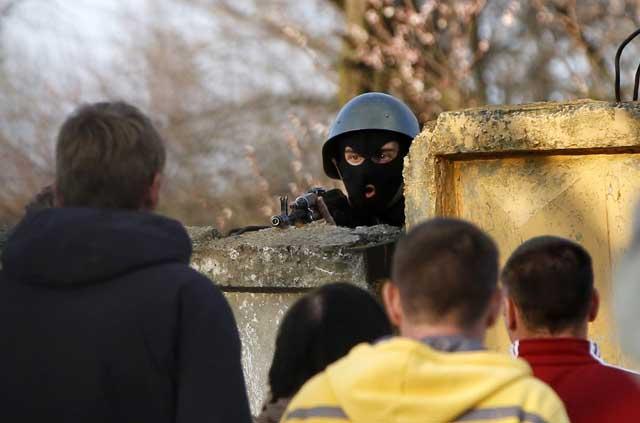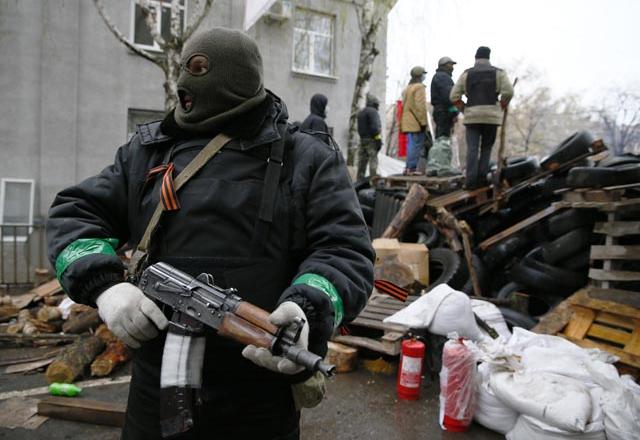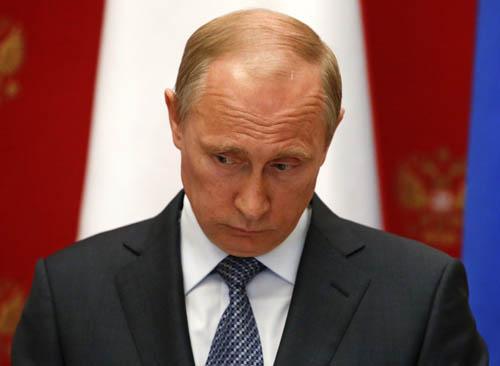You are here
Ukraine launches separatist ‘operation’
By Reuters - Apr 15,2014 - Last updated at Apr 15,2014

KIEV/KRAMATORSK, Ukraine — Ukrainian armed forces on Tuesday launched a “special operation” against militiamen in the country’s Russian speaking east, authorities said, recapturing a military airfield from pro-Moscow separatists.
Gunfire could be heard from the airfield at the town of Kramatorsk after a fighter jet swooped low over the area. Ukrainian troops were seen disembarking from helicopters.
A Reuters correspondent in Kramatorsk saw four military helicopters over the airport. Two of these landed and when troops stepped out and walked across the field, locals manning a barricade shouted “Shame! Go back home!”
Ukraine’s acting president Oleksander Turchinov had earlier announced that a military operation was under way to flush pro-Russian separatists out of the government buildings and facilities they have seized in about 10 towns and cities in the east over the last few days.
Turchinov issued a statement saying Ukraine had retaken the airfield in Kramatorsk from pro-Russian militants, while the state security service said an “anti-terrorist” operation was in progress against separatists in the nearby town of Slaviansk.
The operations appeared to mark an escalation of the deepest East-West crisis since the Cold War. The standoff has raised fears in the West and in Kiev that Russia might intervene militarily on behalf of Russian speakers in eastern Ukraine, following its annexation of the Crimean region last month in response to the overthrow of Ukraine’s pro-Moscow president, Viktor Yanukovych, after weeks of protests.
Earlier, pro-Russian militants who had been holed up in the Kramatorsk police headquarters since Saturday left the building — but a state security official in Kiev said separatists had then taken over the agency’s offices in the town.
Shares fall
The reports of military action in eastern Ukraine caused Russian shares to fall sharply, with the main Moscow indices down about 3 per cent.
Russian Prime Minister Dmitry Medvedev gave a gloomy assessment, apparently referring to the deaths of at least two people on Sunday when Kiev unsuccessfully tried to regain control in Slaviansk, about 150km from the Russian border.
“Blood has once again been spilt in Ukraine. The country is on the brink of civil war,” he said on his Facebook page.
Turchinov said an offensive he first announced on Sunday was now in progress after days in which it failed to materialise.
“The anti-terrorist operation began during the night in the north of Donetsk region. But it will take place in stages, responsibly, in a considered way. I once again stress: the aim of these operations is to defend the citizens of Ukraine,” he told parliament.
At least 15 armoured personnel carriers displaying Ukrainian flags were parked by the side of a road around 50km north of Slaviansk, witnesses said.
Ukrainian troops wearing camouflage gear and armed with automatic weapons and grenade launchers were stationed nearby, with a helicopter and several buses containing interior ministry personnel near the road.
In Slaviansk itself, separatists have seized the local headquarters of the police and state security service.
Barricades
Outside the police station about a dozen civilians manned barricades of tyres and wooden crates. A dozen or so armed Cossacks — paramilitary fighters who claim descent from Tsarist-era patrolmen — stood guard at the mayor’s offices. Shops were functioning as usual and bread supplies were normal.
In Kiev, a radical pro-Russian candidate running for Ukrainian presidential elections due next month was beaten up by an angry crowd.
Moscow accuses Kiev of provoking the crisis by ignoring the rights of citizens who use Russian as their first language, and has promised to protect them from attack. Russia also stresses the presence of far-right nationalists among Kiev’s new rulers.
However, a United Nations report on Tuesday cast doubt on whether Russian-speakers were seriously threatened, including those in Crimea who voted to join Russia after Moscow forces had already seized control of the Black Sea peninsula.
“Although there were some attacks against the ethnic Russian community, these were neither systematic nor widespread,” said the report by the UN human rights office.
Russia called the report one-sided, politicised and apparently fabricated.
NATO Secretary General Anders Fogh Rasmussen accused Moscow of involvement in the rebellions. “It is very clear that Russia’s hand is deeply engaged in this,” he told reporters.
Russian Foreign Minister Sergei Lavrov denied that Moscow was stirring up the separatists in the east and southeast as a possible prelude to repeating its annexation of Crimea. “Ukraine is spreading lies that Russia is behind the actions in the southeast,” Lavrov said on a visit to China.
Moscow has demanded constitutional change in Ukraine to give more powers to Russian-speaking areas, where most of the country’s heavy industry lies, while the rebels have demanded Crimean-style referendums on secession in their regions.
Kiev opposes anything that might lead to the dismemberment of the country. But in an attempt to undercut the rebels’ demands, Turchinov has held out the prospect of a nationwide referendum on the future shape of the Ukrainian state.
Reverse flows
The crisis has also prompted fears that Moscow might turn off gas supplies to Kiev, disrupting flows to the European Union. Russian exporter Gazprom promised it would remain a reliable supplier to the EU, but German energy company RWE began deliveries to Ukraine on Tuesday — reversing the usual east-west flow in one central European pipeline.
Central Europe’s pipeline network is designed to carry Russian gas westwards. But Polish operator Gaz-System said it had reversed the flow to send back 4 million cubic metres per day, the equivalent of 1.5 billion annually — a modest volume compared with Ukraine’s need for more than 50 billion.
Moscow has nearly doubled the price it charges Kiev this year, and President Vladimir Putin has threatened to halt supplies if Kiev does not repay more than $2 billion it owes to Gazprom. Putin has also warned EU leaders that this could disrupt their supplies that flow across Ukraine.
Ukrainian state energy company Naftogaz said it was ready to pay in full for imported gas from Russia at $268.5 per 1,000 cubic metres, rather than the $485 Moscow has demanded, which is more than it charges rich Western countries for its gas.
Related Articles
Ukraine’s armed forces plan to launch a “full-scale anti-terrorist operation” against pro-Russian separatists, acting President Oleksander Turchinov said on Sunday, raising the risk of a military confrontation with Moscow.
Pro-Russian rebels shot down a Ukrainian helicopter in fierce fighting near the eastern town of Slaviansk on Monday, and Kiev drafted police special forces to the southwestern port city of Odessa to halt a feared westward spread of rebellion.
Russian President Vladimir Putin called on pro-Moscow separatists in Ukraine to postpone a vote on secession just five days before it was to be held, potentially pulling Ukraine back from the brink of violent dismemberment.
















